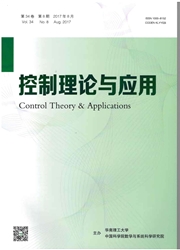

 中文摘要:
中文摘要:
为了解决粒子群算法惯性权重自适应问题,提出一种基于蚁群系统的惯性权重自适应粒子群算法(ASPSO).ASPSO首先将惯性权重取值区间离散化,各个惯性权重子区间在初期赋予相同的信息素;然后,粒子群算法中的各个粒子,根据各个惯性权重子区间中的信息素浓度和粒子在搜索空间中分布的先验知识,确定各个惯性权重子区间的选择概率,并进而实现粒子的空间搜索;最后,基于粒子的进化信息,实现惯性权重子区间信息素浓度的更新.仿真研究表明,ASPSO算法在种群进化寻优的同时,能根据种群的进化信息,通过蚁群算法实现惯性权重参数的自适应调整和进化,且不增加测试函数的调用次数;算法寻优性能优于传统的自适应粒子群算法和根据速度信息自适应调整参数的粒子群算法.同时,算法实际应用于复杂系统模型参数的优化估计,获得满意结果.
 英文摘要:
英文摘要:
To adjust the inertia weight in particle swarm optimization(PSO), we propose a novel self-adaptive particle swarm optimization algorithm based on ant system(AS-PSO). First, the inertia weight space is divided into several regions; each of them is given the same initial intensity of pheromone trails. The probability for selecting a parameter region for each particle is determined by the intensity of the region pheromone trails and the particle's a priori knowledge of the search space. The evolution search is then performed in spaces of solutions. Finally the trail of the regions is updated according to the information of evolution. Experiments indicate that the promising AS-PSO algorithm realizes the evolution and the selfadaptation of the inertia weight by ant colony algorithm without increasing the function calls in evaluation. Results show that AS-PSO obviously outperforms the original self-adaptive PSO and the APSO-VI, in which the parameter is adjusted according to the velocity information. Furthermore, satisfactory results have been obtained when AS-SPO algorithm is applied to estimate the parameter of complex system models.
 同期刊论文项目
同期刊论文项目
 同项目期刊论文
同项目期刊论文
 Adaptive weighted least square support vector machine regression integrated with outlier detection a
Adaptive weighted least square support vector machine regression integrated with outlier detection a A novel adaptive differential evolution algorithm with application to estimate kinetic parameters of
A novel adaptive differential evolution algorithm with application to estimate kinetic parameters of Differential evolution algorithm with co-evolution of control parameters and penalty factors for con
Differential evolution algorithm with co-evolution of control parameters and penalty factors for con A Self-adaptive differential evolution algorithm based on ant system with application to estimate ki
A Self-adaptive differential evolution algorithm based on ant system with application to estimate ki Modified Minimum Covariance Determinant Estimator and Its Application to Outlier Detection of Chemic
Modified Minimum Covariance Determinant Estimator and Its Application to Outlier Detection of Chemic Fuzzy particle swarm optimization integrating with self-adaptive penalty function for constrained op
Fuzzy particle swarm optimization integrating with self-adaptive penalty function for constrained op 期刊信息
期刊信息
